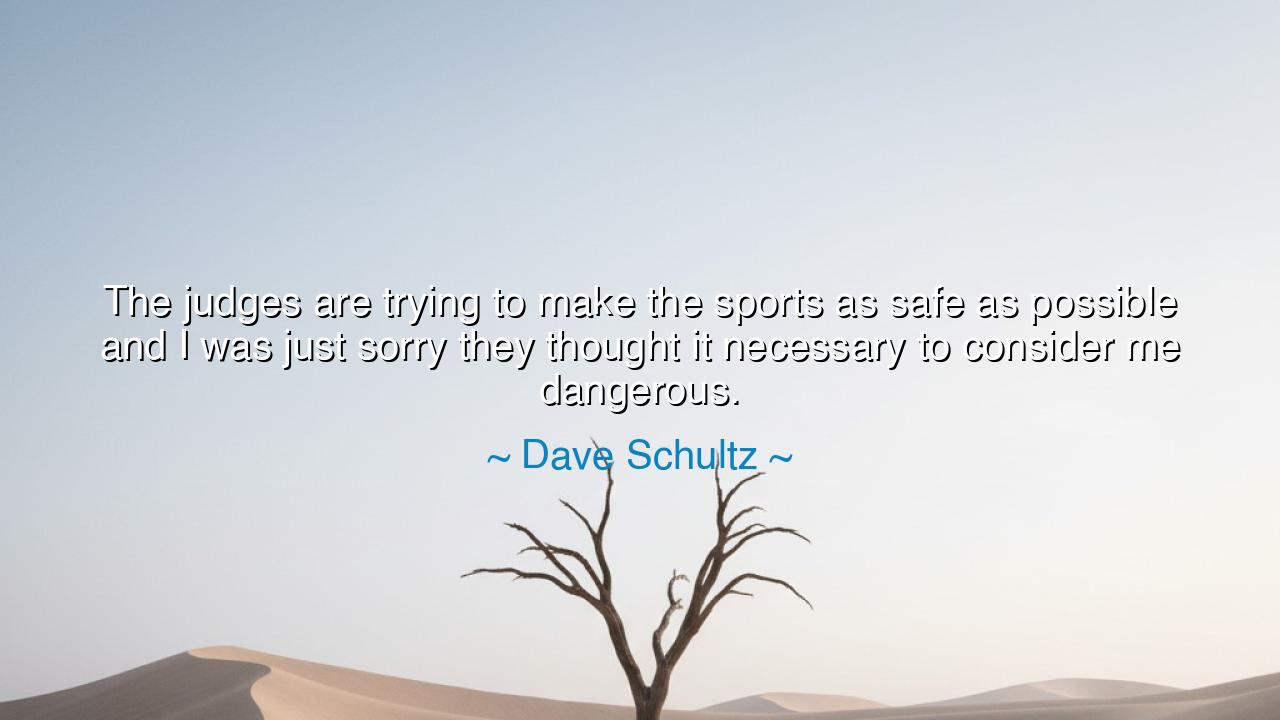
The judges are trying to make the sports as safe as possible and
The judges are trying to make the sports as safe as possible and I was just sorry they thought it necessary to consider me dangerous.






Hear the words of Dave Schultz, a man of wrestling and discipline, who once declared: “The judges are trying to make the sports as safe as possible and I was just sorry they thought it necessary to consider me dangerous.” In this statement lies not only the spirit of an athlete but the paradox of greatness itself—that the strength and mastery which inspire admiration may also provoke caution, fear, or misunderstanding. His words are tinged with humility, regret, and the noble sorrow of one whose power was seen as perilous when it was meant for the glory of competition.
When Schultz speaks of the judges, he acknowledges the guardians of fairness, the ones whose role it is to protect both athlete and sport. Their duty is to preserve life, to ensure that competition does not descend into chaos or needless harm. Yet, in their judgment of him, he was marked as dangerous—not because he sought to harm, but because his skill and ferocity transcended what others could withstand. This is the burden of the gifted: to be misunderstood as a threat when in truth they are a craftsman of their art.
The mention of making sports “as safe as possible” reveals the eternal tension between risk and glory. Sport, at its heart, is a struggle—a test of body, spirit, and will. There is danger in every contest, for without danger, there is no true victory. Schultz’s sorrow is not rebellion against safety, but the lament that his own dedication, his honed mastery, was interpreted as something beyond the bounds of acceptable risk. To be called dangerous was, for him, a wound to the honor he carried as both competitor and man.
History offers us similar tales. Consider the Roman gladiators, some of whom were so skilled that crowds saw them not as murderers but as artists of combat. Yet many were feared as much as they were admired, their power seen as a blade that cut both ways. Or think of Bruce Lee, whose speed and control in martial arts were so unmatched that some film producers slowed his motions for fear that audiences would not believe the truth of his strikes. Greatness, in every age, risks being mistaken for menace.
The deeper meaning of Schultz’s words is the reminder that mastery must always walk with humility. To be powerful is not to abuse power, but to wield it with care. He did not rejoice that others feared him; he mourned it. For the true warrior, the aim is not to dominate through intimidation but to inspire through discipline. He shows us that greatness without honor is hollow, but greatness tempered by respect becomes eternal.
From his sorrow we draw a profound lesson: in life, we may at times be judged not as we intend but as others perceive. Our strength may be mistaken for aggression, our passion for recklessness, our brilliance for arrogance. The task, then, is to remain steady in character, to let humility guide strength, and to ensure that our intentions remain pure, even if others misread them.
The practical action is this: cultivate your gifts, but cloak them in humility. Do not seek to be feared, but to be respected. If others call you dangerous, let your conduct show otherwise. Strive to balance power with mercy, mastery with kindness, and ambition with honor. For in the end, the truest measure of greatness is not how formidable you appear, but how deeply you are remembered for your integrity.
Thus, Schultz’s words endure as both lament and teaching. They remind us that greatness may be misunderstood, but that does not diminish its worth. What matters is not the judgment of the judges, but the purity of the heart that drives the competitor. And the athlete who carries both strength and humility is never truly dangerous—he is eternal.






AAdministratorAdministrator
Welcome, honored guests. Please leave a comment, we will respond soon